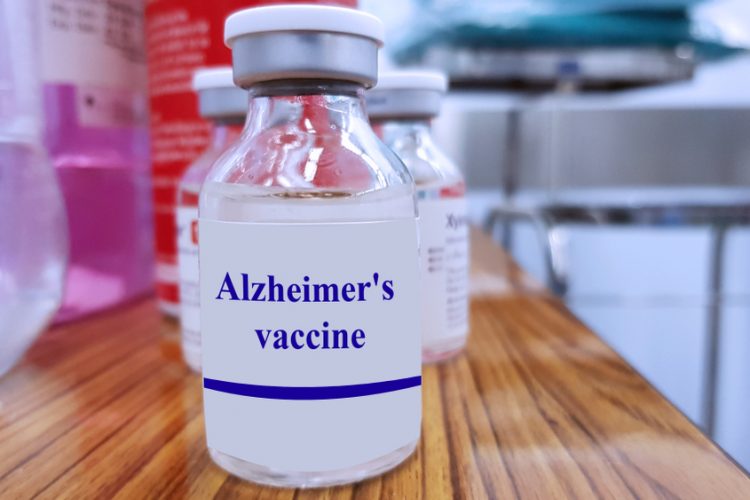Alzheimer’s vaccine shows promise in Phase II trial
Posted: 15 June 2021 | Hannah Balfour (European Pharmaceutical Review) | No comments yet
Study results show AADvac1, a first-in-man Alzheimer’s disease tau vaccine, is safe and potentially of benefit for patients with mild disease.


New Phase II data suggests AXON Neuroscience’s tau vaccine, AADvac1, was safe, well tolerated and generated an exceptional tau antibody response in Alzheimer’s disease (AD) patients.
Hyper-phosphorylated tau accumulated in neurofibrillary tangles (NFT) is one of the hallmarks of AD, alongside amyloid beta plaques. NFT has been shown to be linked to neuronal loss and brain atrophy. In 1991 it was discovered by Professor Heiko Braak that the amount and distribution of NFTs throughout the brain correlates with AD progression and clinical symptoms. This was confirmed in 2015 by a study on over 3,000 brains conducted by the Mayo Clinic.
The Phase II ADAMANT trial was a 24-month placebo-controlled, randomised, parallel group, double-blinded, multi-centre study of AADvac1, an active immunotherapy against pathological tau, in AD patients with mild disease. It enrolled 196 patients across eight European countries and randomised them 3:2 between AADvac1 and placebo.
The primary objective of the study was safety, with secondary objectives of evaluating immunogenicity, efficacy on clinical outcomes and key biomarkers of neurodegeneration. The trial met its primary endpoint, with the vaccine being safe and well tolerated. Serious adverse events occurred in 17.1 percent of AADvac1-treated individuals and 24.1 percent of placebo-treated individuals; and adverse events were observed in 84.6 percent of the AADvac1 arm and 81 percent of placebo arm.
In terms of its secondary endpoints; the vaccine was found to induced high levels of immunoglobulin G (IgG) antibodies; significantly reduce the accumulation of Neurofilament Light Chain (NfL), an important biomarker of neurodegeneration, in the blood by 58 percent; and diminish other core AD cerebrospinal fluid (CSF) biomarkers of tau pathology and tau neurodegeneration, including the most specific CSF biomarker phosphotau–T217. Recent studies have shown that levels of the NfL biomarker in blood reflects the NFT burden in the brain and correlates with cognitive, biochemical and imaging hallmarks of AD.
No significant effects were found in cognitive and functional tests on the whole study sample; however, the most pronounced effects on clinical and functional outcomes were observed in the sub-group of patients with confirmed AD biomarker profile. In this subgroup, AADvac1 in comparison to placebo significantly slowed the clinical decline by 27 percent as measured by CDR-SB (Clinical Dementia Rating-Sum of the Boxes scale) and functional decline by 30 percent as measured by ADCS-MCI-ADL (Alzheimer’s Disease Cooperative Study Activities of Daily Living Scale). This was mirrored by a 62 percent reduction in NfL blood levels, compared to placebo.
According to the investigators, “the therapeutic effect of the AADvac1 treatment on clinical measures and fluid biomarkers supports its potential use to treat and possibly prevent tau pathology, the driving force behind the clinical decline of Alzheimer’s patients.”
Michal Fresser, Chief Executive Officer of AXON Neuroscience, commented: “Our Phase II trial successfully demonstrated the strengths of our lead asset AADvac1, a tau vaccine on track to prevent and treat Alzheimer’s disease. After an extensive peer-review process, we are pleased to publish the results in the scientific journal Nature Aging. The results confirm the disease-modifying effect of AADvac1 and support Axon’s progress toward a pivotal stage of clinical development. In view of the recent approval of amyloid-based therapy, our strong NfL endpoint results could serve as a surrogate in our forthcoming clinical development to achieve accelerated approval.”
About AADvac1
Axon is developing AADvac1 as a vaccine with the potential to halt the progression of tau pathology in AD. It is expected to provide symptomatic relief and potentially prevent disease onset. AADvac1 is currently the most clinically-advanced tau therapy in development and differs from other tau-based therapeutic candidates by targeting both the formation of pathological tau proteins (truncated and oligomerised forms) and the spread of those species already formed. The rest of the industry has been focused primarily on preventing the spread of already-formed pathological tau species.
According to Axon, AADvac1-induced antibodies preferentially discriminate between normal and pathological tau, ensuring only pathological tau are targeted and leaving healthy tau intact.
Related topics
Biologics, Clinical Trials, Drug Development, Drug Safety, Drug Targets, Immunisation, Proteins, Research & Development (R&D), Vaccine Technology, Vaccines









